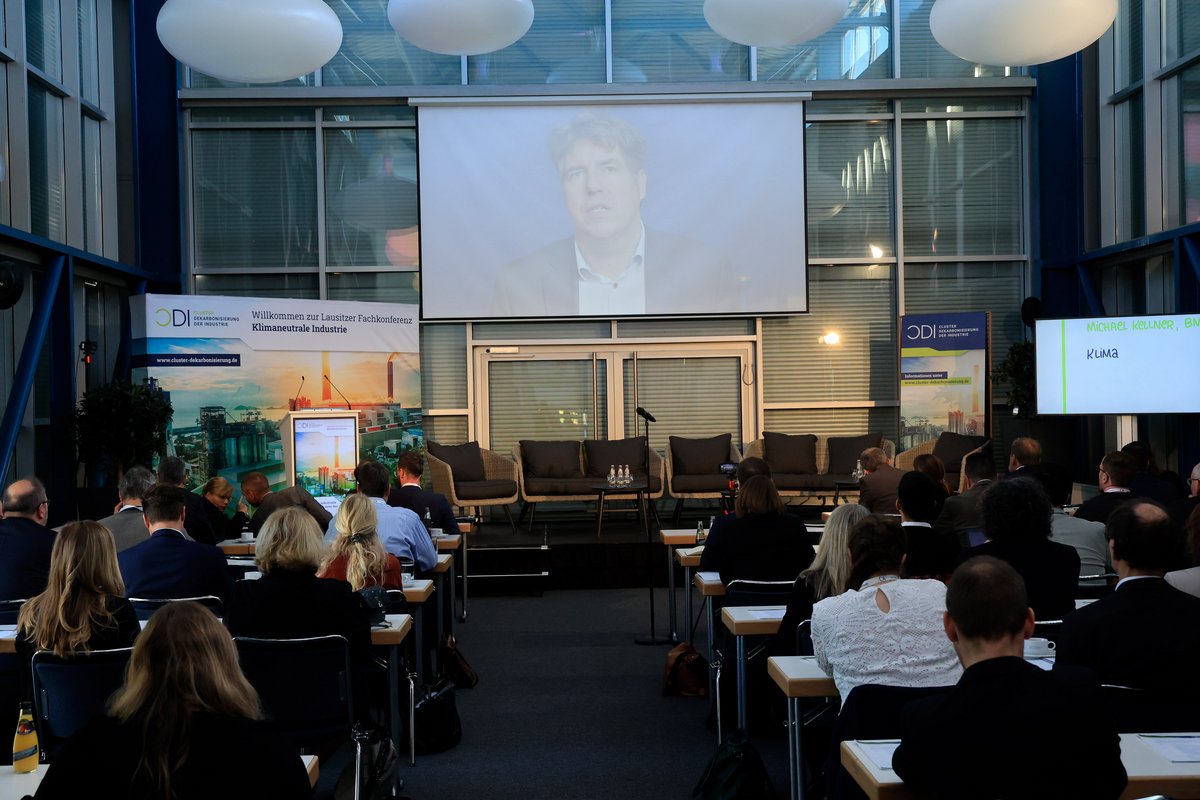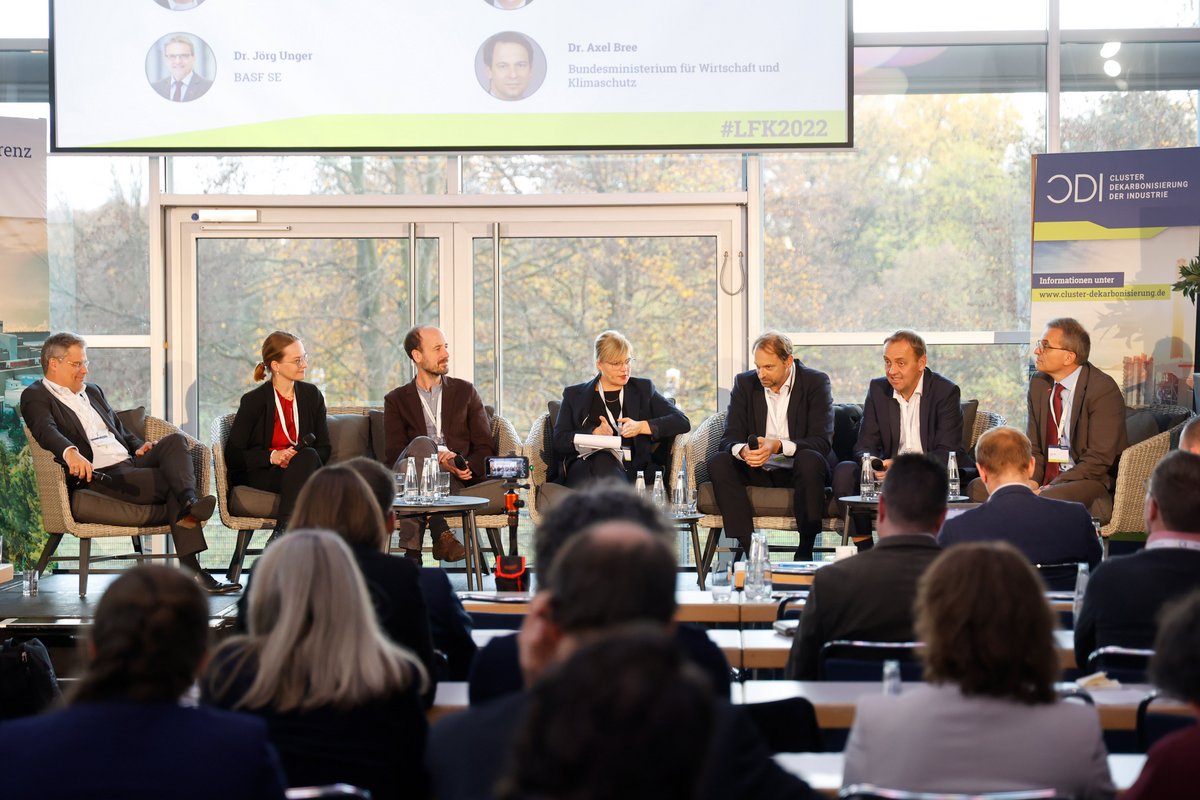Lusatian Conference 2022: Staying the course for decarbonization in the energy crisis
The energy and raw materials crisis caused by Russia's war of aggression against Ukraine poses enormous challenges for German industry. This makes it all the more important for the energy-intensive sectors to continue on their course toward climate neutrality. The industrial transformation requires more speed in the energy turnaround, more cooperation and dialog in the actor landscape and, last but not least, innovative solutions forlow-CO2 production processes. This was the consensual core message of today's Lusatian expert conference hosted by the Cluster Decarbonization of Industry (CDI). Around 370 participating experts from science, industry and politics accepted the CDI's invitation. Digitally as well as on site at Messe Cottbus (Brandenburg), they explored the question of how industrial decarbonization can currently succeed under the political framework conditions.
CDI looks back on one year of networking
The cluster celebrated its official founding at the last Lusatian conference in November 2021. The four CDI founding members are the Brandenburg University of Technology (BTU) Cottbus-Senftenberg, the Institute for Low-Carbon Industrial Processes of the German Aerospace Center (DLR), the Fraunhofer Institute for Energy Infrastructures and Geothermal Energy (IEG) and the Competence Center Climate Protection in Energy-Intensive Industries (KEI), which also operates the CDI coordination office. The declared aim of the players is to provide technical and scientific support to energy-intensive industrial companies during the transformation process in terms of their innovation and competitiveness by pooling their expertise.
In recent months, the interdisciplinary network has grown continuously and now includes more than 50 partners from all over Germany. These include energy-intensive companies - such as the chemical group BASF, the cement manufacturer Cemex and the steel producer Arcelor Mittal - as well as various scientific institutions and associations. The exclusive network meeting "CDI Summer Summit 2022" was held for the first time in Lusatia at the beginning of September. The technical work in the cluster on current issues of decarbonization has started in innovation groups on process heat and acceptance. This is supplemented by external expertise in the form of various studies that have already been commissioned.
The research focus of the BTU Chair of Decarbonization and Transformation of Industry is on transformation research and innovation economics. In this context, both operational, institutional and macroeconomic perspectives are considered. The aim is to understand the transformation process of decarbonization with the importance of all relevant actors.
At the start of the conference, Michael Kellner, Parliamentary State Secretary at the German Federal Ministry of Economics and Climate Protection (BMWK), spoke out in a video message in favor of further energy transformation in the crisis in order to make Germany future-proof as an industrial location: "In addition to the issue of security of supply as well as affordability of electricity and gas, we are not losing sight of greenhouse gas neutrality by 2045. On the contrary - the transformation is a core concern of the Federal Ministry of Economics. By switching to green energy sources, we create a win-win situation: we avoid CO2 and at the same time are less dependent on fossil energy imports. The BMWK is intensively supporting this conversion at all levels and with several funding programs. After all, decarbonizing our industry will be a drastic competitive advantage in the next decade."
In his keynote address, Dr. Georg Kobiela, Industrial Transformation Officer at Germanwatch e.V., emphasized the need to meet German climate protection targets in the current time of crisis. Dr. Tobias Fleiter from the Fraunhofer Institute for Systems and Innovation Research ISI then addressed the transformation paths necessary for a climate-neutral industry. Various inputs also shed light on the future of glass melting, the chemical industry's path to CO2 neutrality, current legal issues in the gas shortage situation and the future of the energy market. Finally, all speakers discussed the success of decarbonization under the current difficult conditions in an expert talk, in which BMWK Head of Department Dr. Axel Bree also took part.
"As a result of the conference, it became clear that the energy crisis has shifted many coordinates in German industry and economic policy that were thought to be secure, thus overturning original timetables. As a result of this external shock, companies have once again become more aware that in the long term there can only be a path to climate neutrality - in order to ultimately also act independently of fossil energy imports," said Andreas Findeisen, head of the coordination office of the Decarbonization of Industry cluster. The CDI also looked back on its first anniversary with the conference.
Interesting facts about the cluster, its partners and industry-specific news are available on the new CDI website: www.cluster-dekarbonisierung.de. There, relevant trade events can be found in an interactive event calendar, as well as job offers from partner companies in the near future. "Our cluster has ambitious plans for 2023 - especially with regard to international conference participation and European networking," explains CDI coordinator Findeisen.


